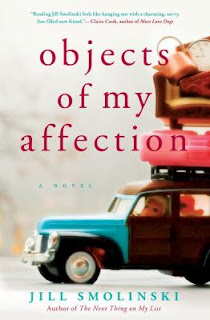Jill Smolinski
Simon and Schuster, 2012
Lucy Bloom is a professional organizer, or at least that’s what she’s supposed to be since she’s the author of a how-to book called Things are not People. She wishes her own life was as organized as her book makes her out to be. Ever since she broke up with her boyfriend and had to sell her house to pay for her son’s rehab, she’s been living out of suitcases on a friend’s couch. Luckily a famous artist’s son read of her book and hired her to clear out the cluttered home of the reclusive woman; maybe she can use the money to start over again herself.
Unfortunately, it’s not easy to persuade Marva Meier Rios to give up any of the belongings she’s accumulated over the past several decades. Marva won’t let Lucy throw away anything without examining it herself first, so each working session is full of persuading and then arguing over each item until Lucy despairs of making any progress. After a short time Lucy determines that Marva is a hoarder, a mental condition that Lucy feels unable to deal with. When Marva’s son issues a deadline with an ultimatum, however, Lucy knows that she has no choice but to tackle the problem head on in order to finally get paid and go forward with her own life.
Lucy is an interesting character because she is so paradoxical. She is supposedly an expert in organization, yet her own life is a mess. She believes that she should sacrifice everything to help her son, yet doesn’t realize that he has taken advantage of her generosity. She is in denial about the reasons she broke up with her ex-boyfriend, projecting the blame onto him for a difficult situation she couldn’t face herself. Lucy has her faults to be sure, but they are realistic and understandable and we end up really rooting for her to finally put herself first. Some may think this is light reading, but there are deeper messages here that make for a meaningful and satisfying reading experience.
Other novels by this author:
The Next Thing on My List (2008)
Other titles you may enjoy:
Past Secrets by Cathy Kelly (2007)
Assisting her friends on Summer Street when secrets threaten their relationships and well-being, Christie finds her own circumstances unbalanced when truths she has hidden from her husband and sons come to the surface.
Dune Road by Jane Green (2009)
A single mom working for a famously reclusive author in a tony Connecticut beach town stumbles on a secret that many of the eccentric and moneyed locals would love to get their hands on.
Not My Daughter by Barbara Delinsky (2010)
A pregnancy pact between three teenaged girls puts their mothers' love to the ultimate test in this emotionally wrenching story of love and forgiveness.







































